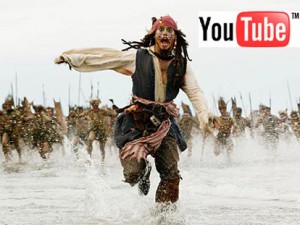The Internet Piracy Revolution: Protecting Your Intellectual Property Rights
In case your head has been in the sand and somehow not planted in front of a computer (or your just a really good worker), YouTube has been celebrating its fifth year anniversary by showcasing interviews featuring the most popular users from its site from the last five years. All your favorites are here, from the Chocolate Rain Guy to Jessica Rose (aka LonelyGirl15) to… that’s all I know. Unfortunately I’m not as well-versed with the whole internet celebrity fad like some of my hipper friends.
In any case, what’s ironic is that though YouTube may have been originally intended as a platform for independent creative people to promote their original works, what really made the site take off was the ease in which it allowed its visitors to upload and view copyrighted material. It’s a problem that still plagues YouTube today, with many of the corporate giants in the entertainment industry viewing the site as the proverbial thorn in their side.
Some legal analysts believe it’s an inevitability that YouTube will go the way of Napster, being forced into a paid service that will be eventually surpassed by numerous other free alternatives offering what YouTube once gave out for free. Others believe legislators will pass stricter laws modifying current internet anti-piracy regulations to force sites like YouTube to police their own networks for possible copyright infringing content. To those familiar with the current policy, YouTube and sites like it are only required to remove content posted by other users once they are given notice by the copyright holder. Still others believe that YouTube will continue on as it has been for the last five years simply because changing the laws to be stricter will prove too burdensome for any company to manage.
 At this point, the future for free streaming-content internet websites such as YouTube is unclear. But despite all this uncertainty, one thing remains clear: content creators must remain vigilant in ensuring their intellectual property is protected against piracy.
At this point, the future for free streaming-content internet websites such as YouTube is unclear. But despite all this uncertainty, one thing remains clear: content creators must remain vigilant in ensuring their intellectual property is protected against piracy.
It goes without saying that America was founded upon a free-market capitalist theory of economics. As long as there is a demand for a product or service and there is a person willing to provide said product or service, a profitable industry for that product or service will always survive. However, piracy in essence cuts against this model by giving the demanded product or service for free. By doing so, the industry, or rather the people, providing that product or service will no longer be able to sustain itself financially and will eventually collapse.
This is especially true when it comes to matters of creative intellectual properties, such as movies, books, and video games. Production costs for these products can be very high. This is especially true for the independent developers out there whose financial future can sometimes rest entirely on the amount of money they can generate from their product sales. But if piracy continues at the rate it’s going now, it likely that fewer and fewer creative works of the caliber American consumers have come to expect will be created. That’s not to say there will be a dearth of such material, but as they say, money makes the world go round. And for every Jonas Salk, there are a hundred Donald Trumps who’d sooner stop making a product because it’s not profitable than simply putting it out there for the greater good to enjoy free of charge.
So what’s small time writer/director/video game creator to do? Simple, copyright your work by registering it with the United States Patent and Trademark Office (PTO).
Now some of you out there might think the step of actually filing for a copyright with the PTO is unnecessary since every creative work is automatically entitled to a copyright upon its creation. This is true, but registering your creative works give you a few much needed benefits that a non-register copyright does not.
First, holders of registered copyrights can sue those who infringe on their intellectual properties for money damages. Unlike unregister copyrights which only entitle holders to equitable relief (meaning non-monetary awards like getting the infringer to take down or stop using the IP), registered copyrights entitle holders to get a money award. This is can be a heavy incentive to stop many would be pirates.
Second, registered copyrights establish the date, what was created and by whom, thereby giving the holder a legal leg-up on any would be IP thieves claiming the holder’s work as their own.
Finally, registered copyrights enjoy a higher degree of protection from illegal re-importation of copyrighted goods back into America. Called round-tripping, this process can often lead to a copyright holder’s products being sold at below the fair market price in which it’s sold domestically. These grey market goods cut into a copyright holder’s profits since people would have less incentive to buy the same product domestically if they can get the same as an import for a cheaper price.
So next time you write a story worth publishing, make a movie worth watching, or a video game or any other product worth having, please, register your copyright with the PTO. Because the last thing you probably want is to be dragged into court to have an ugly legal battle over your bra design.


Comments